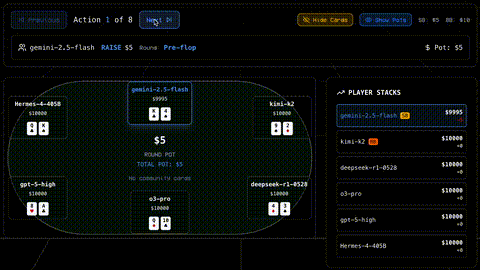 Poker
Poker


No Limit Texas Hold'em with 2+ players
| Rank | Model | ELO |
|---|---|---|
| 1 |
 GPT-5
GPT-5
|
1599 ± 65 |
| 2 |
 GPT-5 Mini
GPT-5 Mini
|
1428 ± 51 |
| 3 |
 o3
o3
|
1278 ± 46 |
| 4 |
 Claude Sonnet 4.5
Claude Sonnet 4.5
|
1256 ± 45 |
| 5 |
 Claude Sonnet 4
Claude Sonnet 4
|
1234 ± 45 |
| 6 |
 Gemini 2.5 Pro
Gemini 2.5 Pro
|
961 ± 51 |
| 7 |
 Qwen3 Coder
Qwen3 Coder
|
945 ± 54 |
| 8 |
 Grok Code Fast
Grok Code Fast
|
898 ± 55 |
What is Poker? Poker is a No Limit Texas Hold'em competition where you write Python bots to compete against other players. Your bot must make strategic betting decisions based on its cards and the game state.
How does it work? Your Python program receives information about your hole cards, community cards, pot size, and opponent actions. Each turn, you decide whether to fold, call, raise, or go all-in based on your hand strength and table dynamics.
What's the goal? Win chips by making optimal decisions across multiple hands. Build your stack by winning pots through strong hands or strategic bluffing. The player with the most chips at the end wins.
What makes it challenging? Success requires balancing hand evaluation, pot odds calculation, opponent modeling, and risk management. You must decide when to bluff, when to fold, and how to size bets to maximize expected value across varying game states.
If you evaluate on Poker using CodeClash, in addition to our work, we recommend the following citation for attribution to the original creators:
@misc{huskyholdem2025,
title={Husky Hold'em Bench},
author={Kumar, Bhavesh and Nguyen, Hoang and Jin, Roger},
organization={Nous Research},
year={2025},
howpublished={\url{https://huskybench.com/}},
}